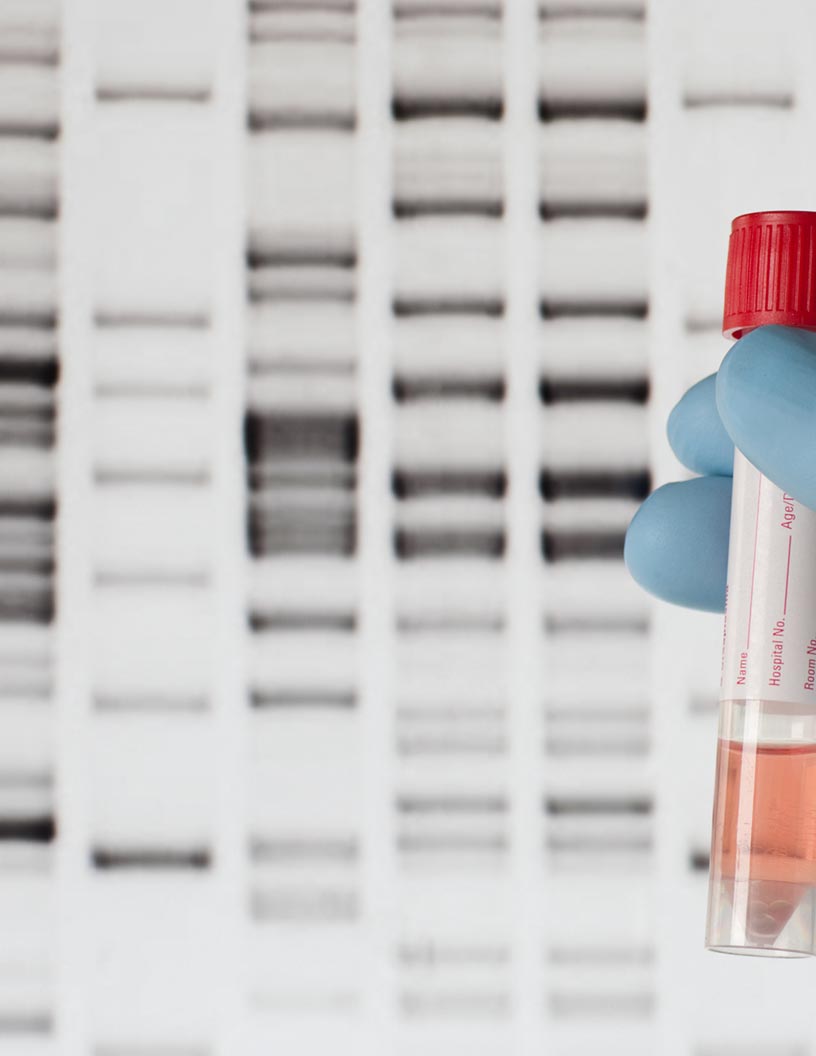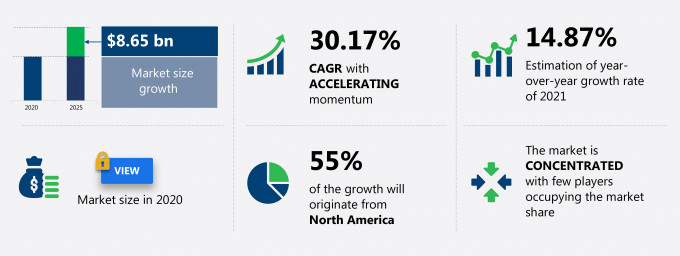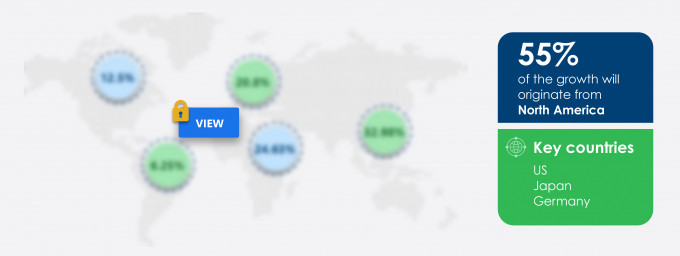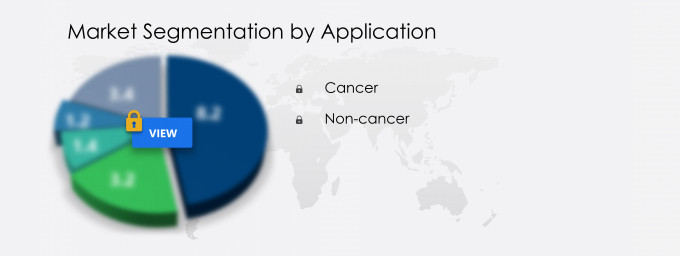The biosimilar monoclonal antibodies (mAbs) market share is expected to increase by USD 8.65 billion from 2020 to 2025, and the market’s growth momentum will accelerate at a CAGR of 30.17%.
This biosimilar monoclonal antibodies (mAbs) market research report provides valuable insights on the post COVID-19 impact on the market, which will help companies evaluate their business approaches. Furthermore, this report extensively covers biosimilar monoclonal antibodies (mAbs) market segmentation by application (cancer and non-cancer) and geography (North America, Europe, Asia, and ROW). The biosimilar monoclonal antibodies (mabs) market report also offers information on several market vendors, including Amgen Inc., BIOCAD, Biocon Ltd., BioXpress Therapeutics SA, Boehringer Ingelheim International GmbH, Celltrion Inc., Coherus BioSciences Inc., Intas Pharmaceuticals Ltd., Novartis AG, and Pfizer Inc. among others.
What will the Biosimilar Monoclonal Antibodies (mAbs) Market Size be During the Forecast Period?
Download the Free Report Sample to Unlock the Biosimilar monoclonal antibodies (mAbs) Market Size for the Forecast Period and Other Important Statistics
Biosimilar Monoclonal Antibodies (mAbs) Market: Key Drivers, Trends, and Challenges
The increasing prevalence of chronic diseases is notably driving the biosimilar monoclonal antibodies (mAbs) market growth, although factors such as the presence of stringent regulatory policies may impede the market growth. Our research analysts have studied the historical data and deduced the key market drivers and the COVID-19 pandemic impact on the biosimilar monoclonal antibodies (mAbs) industry. The holistic analysis of the drivers will help in deducing end goals and refining marketing strategies to gain a competitive edge.
Key Biosimilar Monoclonal Antibodies (mAbs) Market Driver
The increasing prevalence of chronic diseases is a major factor driving the global biosimilar monoclonal antibodies (mAbs) market share growth. Globally, the rising prevalence of chronic diseases has become a major public health concern. If left untreated, chronic disorders including cancer and autoimmune diseases can lead to death. According to the National Institutes of Health (NIH), an estimated 1,735,350 new cases of cancer were detected in the United States in 2018. In 2018, there were 609,640 cancer-related fatalities in the United States. Breast cancer, prostate cancer, colon and rectum cancer, skin melanoma, lung and bronchus cancer, bladder cancer, kidney, and renal pelvis cancer, endometrial cancer, leukaemia, pancreatic cancer, thyroid cancer, non-Hodgkin lymphoma, and liver cancer were among the most frequent types of cancer. Furthermore, 0.59 percent of new cancer cases in Canada are predicted to be diagnosed in 2019. As per the Centers for Disease Control and Prevention (CDC), in 2017, 54.4 million adults in the US had arthritis, which accounted for about 25% of the population. As the treatment costs of the above-mentioned diseases are high, the development of cost-effective therapeutics becomes imperative. As biosimilar mAbs are a cost-effective option, their demand from patients is increasing.
Key Biosimilar Monoclonal Antibodies (mAbs) Market Trend
The increasing R&D of biosimilar mAbs is another factor supporting the global biosimilar monoclonal antibodies (mAbs) market share growth. In recent years, the worldwide biosimilar mAbs market has seen a surge in the number of strategic agreements, which has helped vendors improve their market shares. Collaborations are used by vendors as a means of expanding their product ranges and strengthening their businesses. Such collaborations also lead to technological advancements. The following are some examples of collaborations: BiosanaPharma BV (Biosana) and Singapore's Bioprocessing Technology Institute (BTI) inked a research agreement in November 2019 to accelerate the process development of innovative pharmaceuticals and biosimilar mAbs. iBioPharma Inc. (iBio) and CC-Pharming launched a collaboration in China in August 2019 to produce a biological clone of rituximab. The development of such biosimilar mAbs for various diseases will provide patients with cost-effective options, thereby accelerating market growth during the forecast period.
Key Biosimilar Monoclonal Antibodies (mAbs) Market Challenge
The presence of stringent regulatory policies will be a major challenge for the global biosimilar monoclonal antibodies (mAbs) market share growth during the forecast period. The presence of stringent regulations imposed by regulatory bodies across the world is a challenge for the growth of the global biosimilar monoclonal antibodies market. The US FDA has imposed stringent regulations for the marketing approval and manufacturing of biosimilars. Vendors must provide all the information associated with the developmental therapy to the US FDA reviewer to obtain approval. This should include the results of studies conducted in animal models, the pharmacokinetic and pharmacodynamic properties of the biosimilar, and the safety profile maintained during clinical studies conducted on humans. In addition, there is an intense focus on proving similarity to the reference originator drug by providing a combination of biological, physicochemical, and clinical data, which is not required for novel drugs. Other details that must be submitted by vendors include dosage, route of administration, contraindications, warnings, and precautions. This incurs a high financial burden on the R&D of mAbs, thereby hampering the market.
This biosimilar monoclonal antibodies (mAbs) market analysis report also provides detailed information on other upcoming trends and challenges that will have a far-reaching effect on the market growth. The actionable insights on the trends and challenges will help companies evaluate and develop growth strategies for 2021-2025.
Parent Market Analysis
Technavio categorizes the global biosimilar monoclonal antibodies (mAbs) market as a part of the global pharmaceuticals market. Our research report has extensively covered external factors influencing the parent market growth potential in the coming years, which will determine the levels of growth of the biosimilar monoclonal antibodies (mAbs) market during the forecast period.
Who are the Major Biosimilar Monoclonal Antibodies (mAbs) Market Vendors?
The report analyzes the market’s competitive landscape and offers information on several market vendors, including:
- Amgen Inc.
- BIOCAD
- Biocon Ltd.
- BioXpress Therapeutics SA
- Boehringer Ingelheim International GmbH
- Celltrion Inc.
- Coherus BioSciences Inc.
- Intas Pharmaceuticals Ltd.
- Novartis AG
- Pfizer Inc.
This statistical study of the biosimilar monoclonal antibodies (mAbs) market encompasses successful business strategies deployed by the key vendors. The biosimilar monoclonal antibodies (mAbs) market is concentrated and the vendors are deploying organic and inorganic growth strategies to compete in the market.
Product Insights and News
- Amgen Inc.- The company offers KANJINTITM for the treatment of adjuvant breast cancer, metastatic breast cancer, and metastatic gastric cancer.
To make the most of the opportunities and recover from post COVID-19 impact, market vendors should focus more on the growth prospects in the fast-growing segments, while maintaining their positions in the slow-growing segments.
The biosimilar monoclonal antibodies (mAbs) market forecast report offers in-depth insights into key vendor profiles. The profiles include information on the production, sustainability, and prospects of the leading companies.
Biosimilar Monoclonal Antibodies (mAbs) Market Value Chain Analysis
Our report provides extensive information on the value chain analysis for the biosimilar monoclonal antibodies (mAbs) market, which vendors can leverage to gain a competitive advantage during the forecast period. The end-to-end understanding of the value chain is essential in profit margin optimization and evaluation of business strategies. The data available in our value chain analysis segment can help vendors drive costs and enhance customer services during the forecast period.
The value chain of the global pharmaceuticals market includes the following core components:
- Inputs
- Inbound logistics
- Operations
- Outbound logistics
- Marketing and sales
- Service
- Support activities
- Innovation
The report has further elucidated on other innovative approaches being followed by manufacturers to ensure a sustainable market presence.
Which are the Key Regions for Biosimilar Monoclonal Antibodies (mAbs) Market?
For more insights on the market share of various regions Request for a FREE sample now!
55% of the market’s growth will originate from North America during the forecast period. The US is the key market for the biosimilar monoclonal antibodies (mAbs) market in North America. Market growth in this region will be faster than the growth of the market in all other regions.
The significant increase in the adoption of cloud services by enterprises across industries in countries will facilitate the biosimilar monoclonal antibodies (mAbs) market growth in North America over the forecast period. This market research report entails detailed information on the competitive intelligence, marketing gaps, and regional opportunities in store for vendors, which will assist in creating efficient business plans.
What are the Revenue-generating Application Segments in the Biosimilar Monoclonal Antibodies (mAbs) Market?
To gain further insights on the market contribution of various segments Request for a FREE sample
The biosimilar monoclonal antibodies (mAbs) market share growth in the cancer segment will be significant during the forecast period. There has been a significant increase in the incidence of cancer globally. As per the International Agency for Research on Cancer (IARC), in 2018, there were 17.0 million new cancer cases worldwide, and the number is expected to grow to 27.5 million new cancer cases by 2040. In recent years, cancer treatment has revolutionized with the introduction of several agents such as mAbs. Therefore, several vendors are developing biosimilar mAbs as they are cost-effective treatments.
This report provides an accurate prediction of the contribution of all the segments to the growth of the biosimilar monoclonal antibodies (mAbs) market size and actionable market insights on the post-COVID-19 impact on each segment.
|
Biosimilar Monoclonal Antibodies (mAbs) Market Scope |
|
|
Report Coverage |
Details |
|
Page number |
120 |
|
Base year |
2020 |
|
Forecast period |
2021-2025 |
|
Growth momentum & CAGR |
Accelerate at a CAGR of 30.17% |
|
Market growth 2021-2025 |
$ 8.65 billion |
|
Market structure |
Concentrated |
|
YoY growth (%) |
14.87 |
|
Regional analysis |
North America, Europe, Asia and ROW |
|
Performing market contribution |
North America at 55% |
|
Key consumer countries |
US, Japan, Germany, and France |
|
Competitive landscape |
Leading companies, Competitive strategies, Consumer engagement scope |
|
Key companies profiled |
Amgen Inc., BIOCAD, Biocon Ltd., BioXpress Therapeutics SA, Boehringer Ingelheim International GmbH, Celltrion Inc., Coherus BioSciences Inc., Intas Pharmaceuticals Ltd., Novartis AG, and Pfizer Inc. |
|
Market dynamics |
Parent market analysis, Market growth inducers and obstacles, Fast-growing and slow-growing segment analysis, COVID 19 impact and recovery analysis and future consumer dynamics, Market condition analysis for forecast period |
|
Customization purview |
If our report has not included the data that you are looking for, you can reach out to our analysts and get segments customized. |
What are the Key Data Covered in this Biosimilar Monoclonal Antibodies (mAbs) Market Report?
- CAGR of the market during the forecast period 2021-2025
- Detailed information on factors that will drive biosimilar monoclonal antibodies (mAbs) market growth during the next five years
- Precise estimation of the biosimilar monoclonal antibodies (mAbs) market size and its contribution to the parent market
- Accurate predictions on upcoming trends and changes in consumer behavior
- The growth of the biosimilar monoclonal antibodies (mAbs) industry across North America, Europe, Asia and ROW
- A thorough analysis of the market’s competitive landscape and detailed information on vendors
- Comprehensive details of factors that will challenge the growth of biosimilar monoclonal antibodies (mAbs) market vendors
We can help! Our analysts can customize this report to meet your requirements. Get in touch



